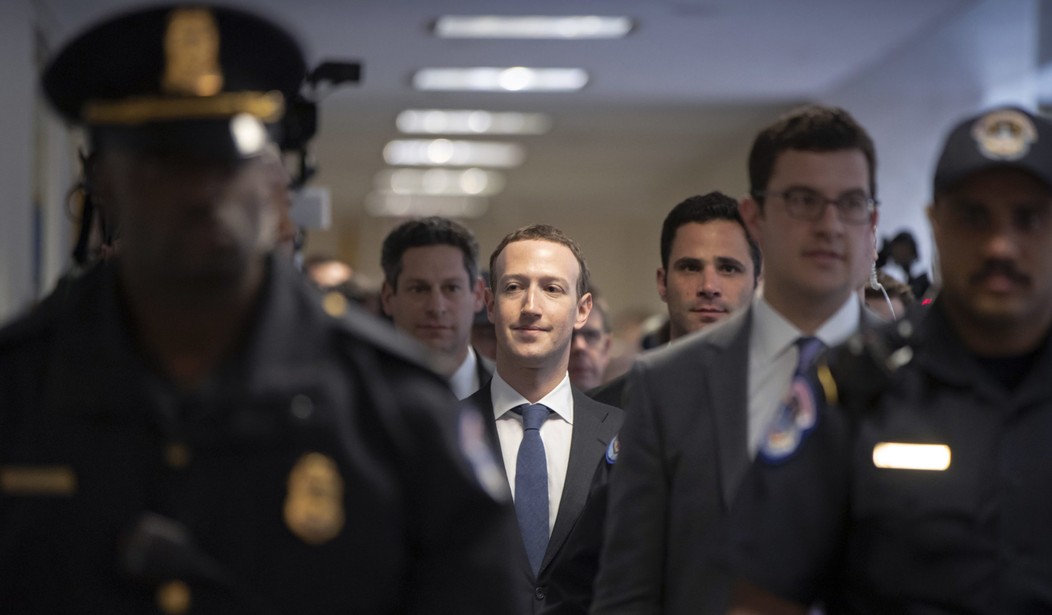There’s a very old, very bad joke about men and boys and ancient Greece that I won’t repeat here, but the punchline remains the same if the question is: “How do you separate Mark Zuckerberg from Facebook?” The social media giant is under fire again for its sociopathic ways from the Left, the Right, and even from one of its co-founders.
Earlier this week, Evan Greer wrote that “Mark Zuckerberg has to go,” and went on to list 25 reasons why. In addition to Facebook’s all-too-common security lapses, Greer notes the company’s lax attitude toward privacy (even if you aren’t a user), its subterranean data-sharing with third parties, and how cozy the company seems to be with various right-wing groups (you read that right). The flip side, of course, is Facebook’s well-known de-platforming of conservative personalities and anyone else the progressive firm deems “hateful.”
It’s gotten so bad that yesterday Facebook co-founder Chris Hughes said the company is “far too big. It’s far too powerful. And most importantly, its CEO, Mark Zuckerberg, is not accountable.” NBC News quotes Hughes saying that he doesn’t think Zuckerberg can “fix” Facebook. “I think only government can — by making the market more competitive, by breaking it up, and by creating these privacy restrictions.”
Honestly though, all this is just Facebook being Facebook. Not since Apple’s iMac-iPod-iPhone-iPad heyday under Steve Jobs’ second regime has a company been a more perfect reflection of its founder. But whatever the company’s predations, lapses, or silencing of dissent, you can’t cleave Zuckerberg from Facebook any more than you can separate a cyborg’s human brain from its robot body.
To find out why, go back to Steve Jobs’ first regime at Apple. When the Mac debuted in 1984 to rave reviews and lousy sales, a rift developed between Jobs and John Scully, whom Jobs had hand-picked to serve as CEO:
A power struggle erupted between Sculley and Jobs. In the spring of 1985 Apple’s board sided with the CEO, removing Jobs from his command of the Macintosh group.
“They basically stripped Jobs of responsibilities and gave him an office that he referred to as ‘Siberia.’ Well, someone like Steve Jobs could not sit in Siberia,” Deutschman said. “Jobs told his closest friends and colleagues that it was a betrayal.”
Whatever you want to call his demotion and internal exile, Jobs soon left in a huff and sold all but one of his shares in the company he’d co-founded ten years prior.
Before taking FB public, Mark Zuckerberg reportedly feared getting “Jobsed” someday by his own board, and structured Facebook shares accordingly. Dan Bigman wrote for Forbes in 2012 that Zuck “set up the company so that Class-B shares (which he controls) carry ten times the voting power of the A-shares. That means he owns about 18% of the company, but controls more than 50% of the voting power.” Zuckerberg’s coterie controls another 10%, making them a virtually untouchable voting bloc, or what one investor called a “dictatorship.”
Not everyone, not even Facebook investors with all those profits, is happy with Zuckerberg’s Stalin-like grip. Just last month, a group of Facebook investors began “another dramatic bid to oust Mark Zuckerberg,” and alter the company’s share structure, too. Details from BI:
Business Insider broke the news of the proposal in July last year after revealing the plans of activist shareholder Trillium Asset Management, which had grown tired of the “mishandling” of scandals including the Cambridge Analytica data breach.
Responding to the proposal in the SEC filing, Facebook called on investors to vote it down.
Given that Zuckerberg and his tight-knit group of insiders control about 70% of the ballots, that might be even easier done than said. (See what I did there?). As BI notes in the same story, “A similar proposal in 2017 was popular among independent investors but was crushed because of Zuckerberg’s voting power.”
Short of a years-long antitrust investigation and eventual breakup, the Zuckerberg/Facebook Cyborg is going to continue crushing skulls for years to come.










Join the conversation as a VIP Member